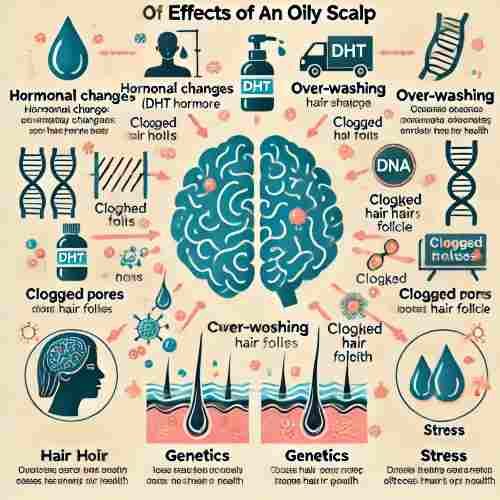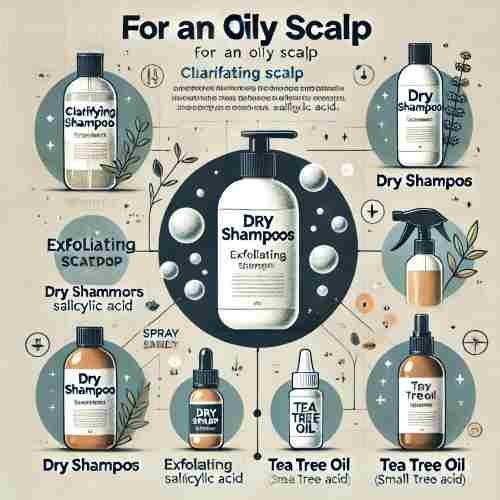An oily scalp can be frustrating to deal with, as it can make hair look greasy, flat, and unclean even after washing. This condition occurs when the scalp produces too much sebum, a natural oil that helps to keep hair healthy but can lead to problems when overproduced.
Factors like genetics, hormonal imbalances, overwashing, and even stress can cause excess oil production. Fortunately, there are various remedies and treatments available to help control an oily scalp, keeping hair fresh and balanced.
Recommended Reading: 10 Best Hair Serum For Regrowth (Frizz Control & Shine)
Oily Scalp Remedies (Greasy Hair: Causes & How To Treat)

Table Of Contents
Recommended Reading: Supplements For Hair Loss In Females (Supplements For Hair Growth)
Causes of an Oily Scalp
Causes of an Oily Scalp
This condition occurs when the scalp produces too much sebum, a natural oil that helps to keep hair healthy but can lead to problems when overproduced.

- Hormonal Changes: Increased levels of DHT hormone can boost oil production and shrink hair follicles, potentially leading to thinning hair.
- Over-Washing: Washing hair too frequently can strip the scalp of natural oils, causing it to produce more oil in response.
- Clogged Pores: Buildup of dirt, oil, and hair products can block pores, leading to inflamed hair follicles.
- Genetics: Family history can play a significant role in having an oily scalp.
- Stress: Increased stress levels can heighten oil production, worsening scalp oiliness.
Recommended Reading: 10 Best Curly Hair Products (Men+Women) [Frizzy Hair Products]
How It Affects Hair?
- Clogs Hair Follicles: Excess oil buildup can block hair follicles, making it harder for new hair to grow.
- Weakens Hair Roots: Congested follicles lead to weaker roots, increasing the risk of hair thinning and hair loss.
- Causes Inflammation: Trapped oil can trigger inflammation, further disrupting the hair growth cycle.
- Disrupts Hair Growth: Inflammation and clogged follicles interfere with normal hair growth, worsening the problem.
- Scalp Balance is Key: Keeping the scalp clean and balanced helps prevent these issues and supports healthy hair growth.
Recommended Reading: Vitamins For Hair Growth And Thickness (Male+Female)
Treatment Options
Best Treatment Options
Manage an oily scalp with apple cider vinegar for pH balance, aloe vera for soothing, and tea tree oil for oil control. Exfoliate with salicylic or lactic acid, use dry shampoo for quick fixes, and follow a routine with clarifying shampoo, conditioner on ends, gentle scalp massage, and pre-shampoo treatments.

Home Remedies for Oily Scalp
Here are some effective home remedies to help manage an oily scalp:
- Apple Cider Vinegar: Mix one part apple cider vinegar with two parts water and use it as a rinse after shampooing. It helps balance the scalp’s pH and can reduce excess oil.
- Aloe Vera: Applying pure aloe vera gel directly to the scalp can soothe irritation and control oil buildup, leaving the scalp feeling refreshed.
- Tea Tree Oil: With its natural antibacterial properties, tea tree oil is great for tackling both dandruff and excess oil. You can add a few drops to your shampoo or use it in scalp treatments.
- Exfoliation: Products that contain salicylic or lactic acid can gently exfoliate the scalp, helping to remove oil and clear clogged follicles.
- Dry Shampoo: For a quick fix between washes, dry shampoo can absorb excess oil and give your hair a fresh, voluminous look without water.
Effective Hair Care Routine
Recommended Reading: Hair Thinning Treatment: Causes, Vitamins, And More
Best Practices for Managing an Oily Scalp
- Use a Clarifying Shampoo: Apply once a week to remove excess oil and product buildup, but avoid overuse to prevent dryness.
- Apply Conditioner Correctly: Use a lightweight conditioner only on the ends of your hair, avoiding the roots to prevent excess oil.
- Gentle Scalp Massage: While washing, massage the scalp gently instead of scrubbing hard to avoid triggering more oil production.
- Pre-Shampoo Treatments: Use scalp exfoliants before washing to remove grease and buildup for a cleaner scalp.
How to Maintain a Healthy Scalp
- Wash Regularly: Wash your hair regularly, but avoid over-washing as it may strip away natural oils, causing your scalp to produce even more oil.
- Healthy Diet: Eating a balanced diet, especially one low in sugar and refined carbs, can help control oil production. Including more fruits, vegetables, and whole grains can also improve scalp health.
- Manage Stress: Stress can lead to excess oil production. Try activities like yoga, meditation, or regular exercise to manage stress and keep oil levels in check.
- Clean Your Tools: Make sure to clean your hairbrushes and combs often to remove dirt, oil, and product buildup that can transfer back to your scalp.
- Use Light Products: Stick to lightweight, water-based hair products, and avoid heavy or oil-based ones that can make your scalp feel greasy.
Products & Remedies
Products & Remedies
Use clarifying shampoos for oil and buildup, dry shampoos for quick refresh, exfoliating treatments for deep cleansing, and tea tree oil products to reduce oil and dandruff.

- Clarifying Shampoos: These shampoos are great for getting rid of excess oil and product buildup.
- Dry Shampoos: If you need a quick fix between washes, dry shampoos are perfect for soaking up excess oil and keeping your hair looking fresh.
- Exfoliating Scalp Treatments: Products with ingredients like salicylic acid can help remove dead skin cells and excess oil, keeping your scalp clean and balanced.
- Tea Tree Oil Products: Tea tree oil is known for its ability to reduce oil production and fight dandruff, making it a great choice for those with oily scalps.
Recommended Reading: Top 10 Beard Care Products (Beard Care Kit)
FAQs
What causes an oily scalp?
An oily scalp occurs when the sebaceous glands in your scalp produce excess sebum (natural oils). This can be caused by hormonal changes, genetics, stress, overwashing, or a poor diet.
How often should I wash my oily scalp?
It’s important not to over-wash your scalp, as this can strip away natural oils, leading to more oil production. Aim to wash your scalp 2-3 times a week, depending on your hair type.
Can diet affect my oily scalp?
Yes, your diet can impact the oil production in your scalp. Foods that are high in sugar or refined carbohydrates can trigger oil production.
Is it okay to use dry shampoo for an oily scalp?
Dry shampoo can be a helpful solution for absorbing excess oil between washes.
Can stress make my oily scalp worse?
Yes, stress can increase oil production. When you’re stressed, your body releases hormones like cortisol, which can trigger your sebaceous glands to produce more oil. Managing stress through activities like yoga, meditation, or exercise can help reduce excess oil.
Recommended Reading: 7 Best Shampoo Greasy Hair (Oily Hair+Dandruff Shampoos)
Conclusion
Dealing with an oily scalp can be tricky, but with the right products and care, it’s manageable. Using the appropriate treatments, whether at-home remedies or specialized hair care products, can help reduce excess oil and keep your scalp balanced. Maintaining a regular scalp care routine, exfoliating, and making small changes to your diet or lifestyle can also help control oil production.
Disclaimer
Commissions we earn from partner links on this page do not influence our content. Our editorial content is based on thorough research and insights from qualified medical professionals to ensure the highest standards of accuracy and reliability.
Information provided on Doseway is for educational purposes only. Your health and wellness are unique to you, and the products and services we review may not be suitable for your circumstances. We do not offer personal medical advice, diagnosis, or treatment plans. For specific advice, please consult with a healthcare professional. Doseway adheres to strict editorial integrity standards. To the best of our knowledge, all content is accurate as of the date posted, though offers and information may change. The opinions expressed are the author’s own and have not been influenced, approved, or endorsed by our partners.

 Cart is empty
Cart is empty
Add a Comment